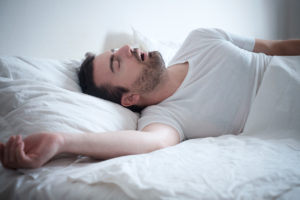 Obstructive sleep apnea is characterized by short intervals where breathing stops during sleep. The higher risk categories for obstructive sleep apnea are males, people who are overweight, those that have someone in the family that has sleep apnea, those over 65 years old, or anyone that uses tobacco products. Sleep apnea has been known to cause restless sleep, daily fatigue, hypertension, morning headaches, irritability, moodiness, depression, stroke, heart attack, diabetes, stroke, loss of productivity, and many other serious preventable problems. In addition to these problems we have compiled a few less known and possibly less understood implications of obstructive sleep apnea.
Obstructive sleep apnea is characterized by short intervals where breathing stops during sleep. The higher risk categories for obstructive sleep apnea are males, people who are overweight, those that have someone in the family that has sleep apnea, those over 65 years old, or anyone that uses tobacco products. Sleep apnea has been known to cause restless sleep, daily fatigue, hypertension, morning headaches, irritability, moodiness, depression, stroke, heart attack, diabetes, stroke, loss of productivity, and many other serious preventable problems. In addition to these problems we have compiled a few less known and possibly less understood implications of obstructive sleep apnea.
Sleep apnea can present with many different signs and symptoms, some of which have the ability of being mistaken for other causative factors. Probably the most effective method to diagnose sleep apnea is to consult your bed partner, if you have one. They can observe you while you sleep for the signs of this arrested breathing. Snoring can be another way to determine if you suffer from obstructive sleep apnea. If this method of analysis is not a possibility, there are many different signs and symptoms resulting from the lack of sleep that obstructive sleep apnea can cause. The following is a few things you could expect if you suffer from this very common problem.
Here are a few lesser known results from the sleep deprivation that occurs as a result of obstructive sleep apnea.
- Sleep deprivation causes accidents. Sleep deprivation is known to have been a factor at Three Mile Island, Exxon Valdez, and Chernobyl. In addition to these infrequent episodes, drowsiness causes many traffic accidents all over the world every day. The NHTSA estimates 100,000 traffic accidents annually are caused by fatigue and sleep related issues.
- Sleep deprivation prevents your full cognitive capacity. Learning is diminished significantly in people suffering from sleep apnea. Attention impairment, alertness, concentration, reasoning, and problem solving are all problems directly caused from the lack of sleep.
- A lack of sleep can kill sex drive. Sleep apnea has been linked to lower testosterone levels in men. Studies have shown that the lack of sleep negatively affects the libido or interest in sex. This can lead to marriage problems.
- Lack of sleep can cause depression. In a poll from 2005 addressing the sleep habits of Americans, people who were clinically depressed or those that suffered from anxiety were more likely to sleep less than six hours at night.
- Sleep deprivation can prematurely age skin. Chronic sleep loss can lead to fine lines and wrinkles, lackluster skin, and dark circles.
- Lack of sleep can make you put on weight. Lack of sleep appears to be somehow related to increases hunger and a larger appetite, and even to obesity. In a clinical study it was found that those who sleep less than six hours daily were nearly 30 percent more prone to obesity than the people that slept seven to nine hours nightly.
- Sleep deprivation impaires judgement. This can lead to a cycle where the person is unaware of just how detrimental the lack of sleep is and can also lack the understanding that it is a lack of sleep that is causing much of these problems.
If any of the problems listed above are what you experience we urge you to schedule a consultation with your dentist. Dentists are now involved in the prevention of sleep apnea. The traditional uncomfortable CPAP device now has stiff competition. In contrast to the CPAP’s forced air, the dental appliances will gently open the airways and allow for the elimination of the obstruction. The results can be astounding.



